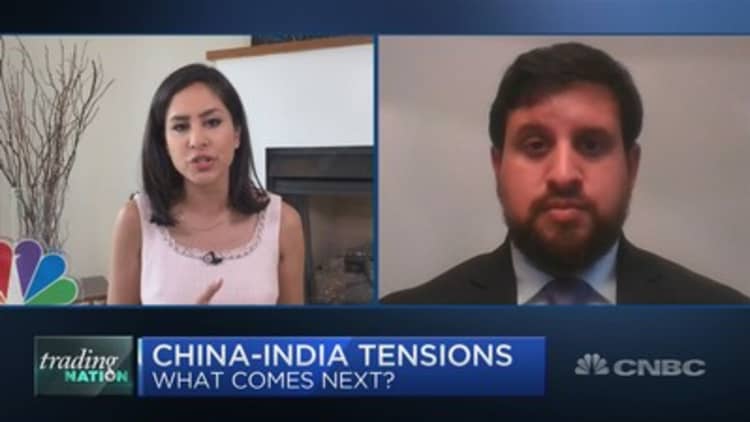
Tensions flared between India and China this week after conflict escalated along the Sino-India border.
At least 20 Indian soldiers were killed in a clash between Chinese troops, raising fears of more conflict to come. The skirmish could propel change to the Indian economy and geopolitics in the region, according to Akhil Bery, Eurasia Group's Southeast Asia analyst.
"This is really unprecedented, what we're seeing right now. Typically, around this time of year we do see these kind of skirmishes but what makes this skirmish much different, is the fact that there are deaths involved," Bery told CNBC's "Trading Nation" on Thursday.
The region, called Aksai Chin, has not seen any fatalities from conflict since 1975. In this confrontation, both countries claimed the others' troops had moved in and overstepped the boundary.
Bery said two reasons could have triggered the conflict. The first is India's construction of infrastructure along its side of the Line of Actual Control, the region that demarcates the Chinese and Indian border.
"The Chinese have taken umbrage to the construction of that because that would allow India to mobilize troops more quickly," said Bery. "The second reason is when India abrogated Article 370 last year, [Indian] Home Minister Amit Shah did say that they consider that Aksai Chin to be a part of India's territory. That naturally raised concerns with the Chinese."
Bery says this development should accelerate India's push to ease its economic reliance on China.
"India has been gravitating more towards a protectionist nature in response to its trade deficit with China. We've seen tariffs raised on a number of electronic goods in recent years, primarily to combat India's trade deficit, which is about $57 billion. So, Eurasia Group would expect to see those kind of actions coming," said Bery.
Bery added the caveat that a reduction of Indian reliance on China would be a long-term effort. The pharmaceutical industry in India, for example, sources 70% of its active ingredients from China.
Instead of China, Bery anticipates India strengthening its relationships with "the quad" – the Untied States, Japan and Australia.





